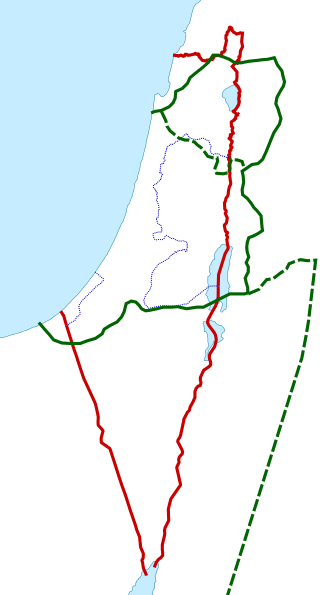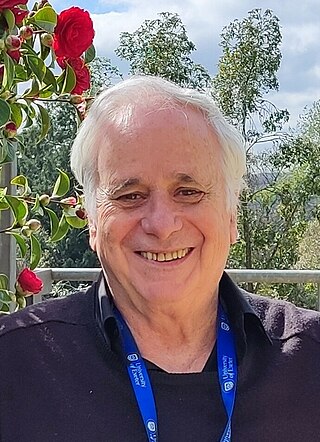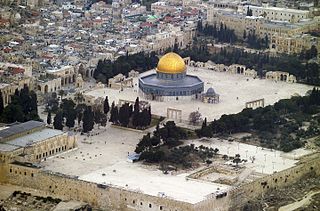
Jerusalem is a city in West Asia, on a plateau in the Judaean Mountains between the Mediterranean and the Dead Sea. It is one of the oldest cities in the world, and is considered holy to the three major Abrahamic religions—Judaism, Christianity, and Islam. Both the State of Israel and Palestine claim Jerusalem as their capital; Israel maintains its primary governmental institutions there, and Palestine ultimately foresees it as its seat of power. Neither claim, however, is widely recognized internationally.

The Temple Mount, also known as Haram al-Sharif, al-Aqsa Mosque compound, or simply al-Aqsa, and sometimes as Jerusalem's holyesplanade, is a hill in the Old City of Jerusalem that has been venerated as a holy site in Judaism, Christianity, and Islam for thousands of years.

East Jerusalem is the sector of Jerusalem that was held by Jordan after the 1948 Arab–Israeli War, as opposed to the western sector of the city, West Jerusalem, which was held by Israel. Under international law, East Jerusalem is considered a part of the West Bank and, therefore, of the Palestinian territories. A number of states recognize East Jerusalem as the capital of the State of Palestine, whereas other states assert that East Jerusalem "will be the capital of Palestine", while referring to it as "an occupied territory".

Palestine is a geographical region in West Asia. Situated in the Southern Levant, it is usually considered to include Israel and the State of Palestine, though some definitions also include parts of northwestern Jordan. Other historical names for the region include Canaan, the Promised Land, the Land of Israel, or the Holy Land.

Isratin or Isratine, also known as the bi-national state, is a proposed unitary, federal or confederate Israeli-Palestinian state encompassing the present territory of Israel, the West Bank and the Gaza Strip. Depending on various points of view, such a scenario is presented as a desirable one-state solution to resolving the Israeli–Palestinian conflict, or as a calamity in which Israel would ostensibly lose its character as a Jewish state and the Palestinians would fail to achieve their national independence within a two-state solution. Increasingly, Isratin is being discussed not as an intentional political solution – desired or undesired – but as the probable, inevitable outcome of the continuous growth of the Jewish settlements in the West Bank and the seemingly irrevocable entrenchment of the Israeli occupation there since 1967.

Efraim Karsh is an Israeli and British historian who is the founding director and emeritus professor of Middle East and Mediterranean Studies at King's College London. Since 2013, he has served as professor of political studies at Bar-Ilan University. He is also a principal research fellow and former director of the Middle East Forum, a Philadelphia-based think tank. He is a vocal critic of the New Historians, a group of Israeli scholars who have questioned the traditional Israeli narrative of the Arab–Israeli conflict.
Religion in Israel is manifested primarily in Judaism, the ethnic religion of the Jewish people. The State of Israel declares itself as a "Jewish and democratic state" and is the only country in the world with a Jewish-majority population. Other faiths in the country include Islam, Christianity and the religion of the Druze people. Religion plays a central role in national and civil life, and almost all Israeli citizens are automatically registered as members of the state's 14 official religious communities, which exercise control over several matters of personal status, especially marriage. These recognized communities are Orthodox Judaism, Islam, the Druze faith, the Catholic Church, Greek Orthodox Church, Syriac Orthodox Church, Armenian Apostolic Church, Anglicanism, and the Baháʼí Faith.

Ilan Pappé is an Israeli historian, political scientist and former politician. He is a professor with the College of Social Sciences and International Studies at the University of Exeter in the United Kingdom, director of the university's European Centre for Palestine Studies, and co-director of the Exeter Centre for Ethno-Political Studies.

Yoav Gelber is a professor of history at the University of Haifa, and was formerly a visiting professor at the University of Texas at Austin.
Nur ad-Din Masalha commonly known in English as Nur Masalha is a Palestinian writer, historian, and academic.

Moshe Amirav is an expert on the conflict in Jerusalem. He is a frequent lecturer at international conferences and forums on Jerusalem and has authored six books and many articles on this subject.

The Jerusalem Waqf and Al-Aqsa Mosque Affairs Department, also known as the Jerusalem Waqf, the Jordanian Waqf or simply the Waqf, is the Jordanian-appointed organization responsible for controlling and managing the current Islamic edifices on the Temple Mount in the Old City of Jerusalem, known to Muslims as Al-Aqsa, which includes the Dome of the Rock. The Jerusalem Waqf is guided by a council composed of 18 members and headed by a director, all appointed by Jordan. The current director of the Waqf, since 2005, is Sheikh Azzam al-Khatib.

Temple denial is the claim that the successive Temples in Jerusalem either did not exist or they did exist but were not constructed on the site of the Temple Mount, a claim which has been advanced by Islamic political leaders, religious figures, intellectuals, and authors.
Joseph Ginat was an Israeli anthropologist, author, political advisor, and soldier.

The Mughrabi Bridge is a wooden bridge connecting the Western Wall Plaza with the Mughrabi Gate of the Temple Mount in Jerusalem.

The Army of the Holy War or Holy War Army was a Palestinian Arab irregular force in the 1947–1948 civil war in Mandatory Palestine led by Abd al-Qadir al-Husayni and Hasan Salama. The force has been described as Husayni's "personal" army. The Arab League set up the Arab Salvation Army as a counter to the Army of the Holy War while, in practice, the Arab governments prevented thousands of volunteers from joining either force.

At present, the Government of Israel controls access to the Temple Mount, also known as Al-Aqsa Mosque compound, in East Jerusalem's Old City, which is a holy place for Muslims, Jews, and Christians and an Islamic religious endowment under the management of the Jordan-based Jerusalem Islamic Waqf. There are entry limits to the Temple Mount for political and security reasons. In addition, Jewish religious law imposes restrictions on religious Jews on entering the compound.

Palestinian nationalism is the national movement of the Palestinian people that espouses self-determination and sovereignty over the region of Palestine. Originally formed in the early 20th century in opposition to Zionism, Palestinian nationalism later internationalized and attached itself to other ideologies; it has thus rejected the occupation of the Palestinian territories by the government of Israel since the 1967 Six-Day War. Palestinian nationalists often draw upon broader political traditions in their ideology, such as Arab socialism and ethnic nationalism in the context of Muslim religious nationalism. Related beliefs have shaped the government of Palestine and continue to do so.

On 15 April 2022, clashes erupted between Palestinians and Israeli Security Forces on the Al-Aqsa Compound in the Old City of Jerusalem. According to the United Nations Special Coordinator for the Middle East Peace Process, the clashes began when Palestinians threw stones, firecrackers, and other heavy objects at Israeli police officers. The policemen used tear gas shells, stun grenades and police batons against the Palestinians. Some Palestinians afterwards barricaded themselves inside the Al-Aqsa Mosque and proceeded to throw stones at the officers. In response, police raided the mosque, arresting those who had barricaded themselves inside. In addition, some damage was done to the mosque's structure.
















